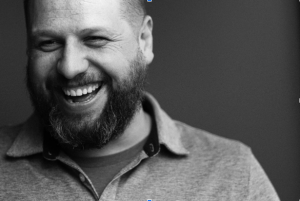Jay Brandenburg-Nau Shares How Acceptance and Commitment Therapy Can Be the First Step to Healing
LITTLETON, COLORADO , USA, June 14, 2019 /EINPresswire.com/ -- Jay Brandenburg-Nau helps clients in his community achieve wholeness and peace by employing a variety of theories and practices without the use of expensive medication. A licensed professional and experienced counselor, he relies on treatments such as Acceptance and Commitment Therapy (ACT) to help his clients overcome emotional and psychological obstacles.
As a full time therapist, Jay Brandenburg-Nau has spent more than a decade providing care and guidance to people struggling in their everyday lives. He notes that many people don’t need to undergo specialized care or require medication to find happiness. He helps them achieve more positive well-being through careful guidance and through treatments like Acceptance and Commitment Therapy.
“Some counselors will advise controlled thinking, where their clients will work to change the way they think and feel by denying any negative feelings,” says Jay Brandenburg-Nau. “In ACT, I teach my clients that some emotions need to be felt, and instead of being controlled by them or trying to change them, they can recognize their importance and the potential to overcome.”
Jay Brandenburg-Nau uses ACT as a way to administer both traditional behavior therapy and psychotherapy. In this way, he helps clients to quit denying or avoiding negative feelings and teaches them to accept these moments, thoughts, or feelings as a natural part of life. They learn that deeper feelings may actually be appropriate responses to external stimuli and that they shouldn’t let these emotions consume them or prevent them from moving on.
From this mindfulness, clients of Jay Brandenburg-Nau ultimately teach themselves to weigh their emotions and responses appropriately and to let them past. Afterward, they are more prepared to accept their unique issues or hardships and make changes in their behavior as a result. They can make peace with the bad and move on to experience the good.
“It isn’t a novel approach to care nor an expensive one that would require medication or rigorous therapy,” says Jay Brandenburg-Nau. “And still, it’s useful for treating anxiety, depression, OCD, and even chronic pain or substance abuse in certain cases.”
Through ACT, clients can pick up on the specific ways they think about themselves or cope with negative sensations in the moment. They learn to gauge overreactions so that they are more prepared for any issues that require immediate action, and know when something is just meant to be felt and then forgotten. ACT will ultimately help them to break away from typical patterns of negativity or overwhelming feelings and begin to practice more optimistic behavior.
“By using ACT as a compass, I can help my clients understand that trying to control psychological experiences or emotions may, in fact, cause more harm than good,” says Jay Brandenburg-Nau. “Mindful behavior allows them to accept the negative and change their emotional state for the better.”

As a full time therapist, Jay Brandenburg-Nau has spent more than a decade providing care and guidance to people struggling in their everyday lives. He notes that many people don’t need to undergo specialized care or require medication to find happiness. He helps them achieve more positive well-being through careful guidance and through treatments like Acceptance and Commitment Therapy.
“Some counselors will advise controlled thinking, where their clients will work to change the way they think and feel by denying any negative feelings,” says Jay Brandenburg-Nau. “In ACT, I teach my clients that some emotions need to be felt, and instead of being controlled by them or trying to change them, they can recognize their importance and the potential to overcome.”
Jay Brandenburg-Nau uses ACT as a way to administer both traditional behavior therapy and psychotherapy. In this way, he helps clients to quit denying or avoiding negative feelings and teaches them to accept these moments, thoughts, or feelings as a natural part of life. They learn that deeper feelings may actually be appropriate responses to external stimuli and that they shouldn’t let these emotions consume them or prevent them from moving on.
From this mindfulness, clients of Jay Brandenburg-Nau ultimately teach themselves to weigh their emotions and responses appropriately and to let them past. Afterward, they are more prepared to accept their unique issues or hardships and make changes in their behavior as a result. They can make peace with the bad and move on to experience the good.
“It isn’t a novel approach to care nor an expensive one that would require medication or rigorous therapy,” says Jay Brandenburg-Nau. “And still, it’s useful for treating anxiety, depression, OCD, and even chronic pain or substance abuse in certain cases.”
Through ACT, clients can pick up on the specific ways they think about themselves or cope with negative sensations in the moment. They learn to gauge overreactions so that they are more prepared for any issues that require immediate action, and know when something is just meant to be felt and then forgotten. ACT will ultimately help them to break away from typical patterns of negativity or overwhelming feelings and begin to practice more optimistic behavior.
“By using ACT as a compass, I can help my clients understand that trying to control psychological experiences or emotions may, in fact, cause more harm than good,” says Jay Brandenburg-Nau. “Mindful behavior allows them to accept the negative and change their emotional state for the better.”
Caroline Hunter
Web Presence, LLC
+1 7865519491
email us here
Legal Disclaimer:
EIN Presswire provides this news content "as is" without warranty of any kind. We do not accept any responsibility or liability for the accuracy, content, images, videos, licenses, completeness, legality, or reliability of the information contained in this article. If you have any complaints or copyright issues related to this article, kindly contact the author above.

